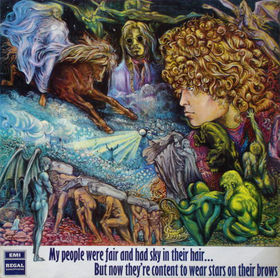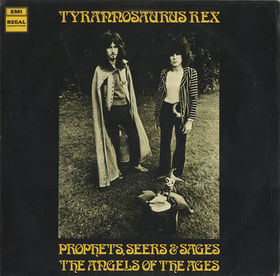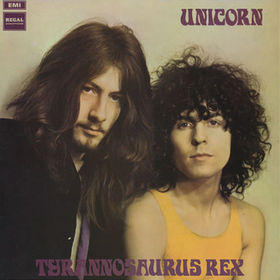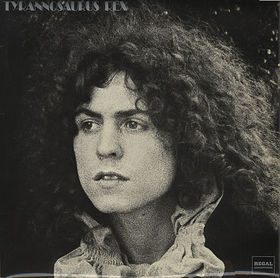Tyrannosaurus Rex, aka T. Rex
aka
TR aka Mr. Rexasauaurs aka Tyranny of the Soral Rexus
Albums reviewed on this page: My People Were Fair and Had Sky in Their Hair
. . . But Now They're Content to Wear Stars on Their Brows,
Prophets, Seers and Sages, Unicorn, A Beard of Stars.
Tyrannosaurus Rex
was a two-person 60s freak folk band that gained more complex
production, less muddy songs and eventually electric guitar(!) in their
lifetime. Upon reaching the age of maturity for bands, which
in
this case scientists have calculated to be somewhere around two years,
the band shortened its name, shed its exoskeleton and generally
improved its outlook. This was no mere Hollywood ploy of
giving
the hot girl glasses, a frumpy wardrobe and a haircut that North
Dakotas found outdated. No, evolution was right to force
changes
upon T.R.,
as its earliest
incarnation is an awful, awful mess. The plot
outline is
this: Marc Bolan on acoustic guitar and mushmouth elaborate vocals and
S.P. Took on assorted complicated percussion (not drums).
Enter
more and more studio overdubs, as Bolan focuses. Exit Took,
replace with hipster M. Finn, continue prior trends. Enter
electric guitar, more overdubs and then the sword comes down, forename
shortened, numbers doubled and the pawn is knighted. Fin.
I've listed the T. Rex
albums I have below, but I'm not going to review them immediately.
Of course, the evolution to electric music was actually a
return
for Bolan, who had been with mod-rock incompetents John's Children.
Personnel: Marc Bolan (guitars, vocals), Steve Peregrine Took
(percussion) replaced by Mickey Finn (percussion) in 1970.
Rhythm section added to form the corpus of T. Rex.
 My
People Were Fair and Had Sky in Their Hair . . . But Now They're
Content to Wear Stars on Their Brows (1968), *
My
People Were Fair and Had Sky in Their Hair . . . But Now They're
Content to Wear Stars on Their Brows (1968), *
It's
my own fault. I should have realized stereotypical images of
mind-blasted hippies with bongos derived from some real person,
somewhere, and that it was only a matter of time before I encountered
it. It turns out Tyrannosaurus Rex were those guys, and damn, were they
hard to endure in their original form.
Their
musical approach is simple: Bolan on acoustic guitar and slurred,
stratosphere vocals, with Took on a variety of drum-like instruments,
with few/no overdubs. Also, a tanker full of drugs, raising
Bolan
to the stratosphere and making his vocals hard to understand.
This approach alone isn't bad; what makes it intolerable is
that
Bolan's songs have few hooks, and his playing is not enough to maintain
interest. Well, surely they were a lyrics band, you might
think.
First, admittedly I'm not English, but Bolan is so sky high I
can't tell what he's singing most of the time. Second, he
repeats
himself a lot, caught in the rhythm of his words, creating the feeling
of a jam without the actual jam. If they were a lyrics band,
perhaps I, an unbeliever, am not affected. The band did have
some
unique aspects
- Bolan's periodic ruffled falsetto, and Took's non-traditional
(non-Western) rhythms and instrumentation. The songs are mostly
indistinguishable, such that I didn't realize I was listening to the
wrong side of the album at one point. A few songs are roughly
blues ("Hot Rod Mama" and "Mustang Ford") and "Scensof" is folky, the
rest populate some magical monochrome dream world in the band's head.
The album closes with "Frowning
Atahuallpa", featuring
Bolan singing Hare Krishna, before breaking into a long children's
story excerpt. I'm sure the dozens of listeners in their
smoke-filled rooms appreciated the sudden shift into child-land from
Bolan's endless vocal grooves. It is the best part of an
album which would sound impossibly dated within a few years.
Produced by Tony Visconti, and it reached the UK top 15.
 Prophets,
Seers and Sages (1968), *1/2
Prophets,
Seers and Sages (1968), *1/2
Minor
improvement, although I've left off the full (totally ridiculous) title.
You can distinguish the songs a bit easier.
The opening "Deboraarobed" is an actual song, with the tape
run
in reverse at its end so you hear the whole thing backwards.
It
isn't awful, so that's a step up, a few other tracks resemble songs
("Conesuela" and "Salamanda Palaganda" among the chosen ones).
The production is also a bit fancier; some overdubs and the
like,
but it still suffers from Bolan's ingesting so many drugs that he
communes with the spirits of Tolkien and Indian mystics and gains the
idea that two chords and some nonsense syllables construct a song.
Also, I still cannot understand most of what he says.
If
you want a man's occasional giggle laughing over an elementary mixture
of Indian and English folk music, search no more. Visconti
produced again, and it did not chart.
 Unicorn (1969),
**
Unicorn (1969),
**
The
upward swing continues, aided mostly because Bolan fashioned his
materials more closely into songs,
and increased overdubs give the material
more depth.
Bolan still relied a bit too much
on attempted sing-along portions ("Stones for Avalon") and his
grandiose lyrics, still often sung without fully
formed consonants. But even though the approach was often
the same, Bolan is usually more intelligible and the results
are
often better. Most of Unicorn
is recognizable as acoustic folk songs, a number of which are decent
("Seal of Seasons", "She was born to be my Unicorn", "Like a White
Star, tangled and far, Tulip that's what you are", "Nijinsky Hind").
Even the acoustic break at the end of "White Star", which
devolved into another sky-high excursion, works. Part of the
(relative) success is due to Visconti's production, which is more
fleshed out (although
no drums), such that the song with the boldest sound is also clearly
the most well-thought out (and best): "Catblack" with Visconti on
clanging piano, shows Bolan using a catchy chorus in something
close to a 50s pop song, instead of repeating it in a mushmouth piece
of
claptrap. Nor did Visconti rely on many production tricks,
occasionally things like sped up vocals (the Teletubbies get high
intro to "'Pon a Hill") or running the tape backwards (the gentle "The
Throat of Winter"). Even with
few tricks, it is clear that Bolan aimed this at his era's freak folk
fans, even giving a number of minutes over to DJ John Peel reading a
children's story ("Romany Soup"). This was also Took's last
album
with the band, and he's rather good at his appointed tasks of difficult
percussive rhythms ("Eueops of Damask"), as well as providing
high-pitched backing vocals and other instruments when required.
For all Unicorn's
progress, Bolan
still could not consistently write good songs, instead relying on his
florid lyrics and hippie vibes, and much of the album is underwritten
and disposable. Yet, even if the whole thing is indistinct,
it
remains a sort of harmless comfort food for listeners. It
reached
#12 in the UK, for what that's worth.
 A
Beard of Stars (1970), ***1/2
A
Beard of Stars (1970), ***1/2
or
Electric Rex, as the instrumental prelude announces. But it's
no
simple
substitution; Bolan wisely augments his folk music with electric
lines from his new axe. Almost everything is still
based on acoustic guitar, and Bolan isn't using the electric in any set
fashion - playing over the rhythm, taking rock interludes ("Pavilions
of the Sun", "Lofty Skies"), but he clearly knows how to play the
instrument well. The underlying material is clearly from the
same mind
as
the earlier albums, but far more cohesive and understandable.
In
other words, Bolan stopped writing songs where the music was an
underwritten frame trying to support his elaborate lyrics.
(Certainly, a lot of folk music focuses on lyrics at the
expense
of music, but Bolan took this direction to extremes, and then sang
dada). Here, the mixture is so markedly better that it's a
bit of a
shock, and the electric additions make it better: "A Daye
Laye", "By
the
Light of the Magical Moon", "Lofty Skies" and "Woodland Bop" are all
very good songs that could have been lost in the mental tye-dye of
earlier versions of Tyr. Rex.
Forerunners of their later sound show up, such as the high
pitched backing vocals and wailing electric guitar lines on "First
Heart Mighty Dawn Dart" or the title track. Micky
Finn, the
new percussionist/sometimes bassist/backing singer/cool looking
hipster-dude, is less of the same from Took - less complicated, less
unusual sounding, but this creates a space for Bolan
to dub
electric on top of the basic duo. But it's not
just electric
guitars, as Bolan was
also using organs more, leading to oddities like the droning
organ+percussion "Organ Blues" or the ominous "Wind Cheetah".
Yet, in the end, it is
all about electric guitar: the album's
closer "Elemental Child" is that which the opening prelude foretold:
Bolan playing something like chugging electric blues-rock and then
breaking into an extended solo/rhythm for over six minutes.
If it were not for Bolan's
voice, you would be hard pressed to place "Elemental Child" on this
album, and certainly not on anything before it. It's a
suitable
ending, an impressive coda and an arrow.
T.
Rex,
or The Band Gets Rhythm
T. Rex (1970)
Electric Warrior
(1971)
The Slider (1972)
Tanx (1973)
 My
People Were Fair and Had Sky in Their Hair . . . But Now They're
Content to Wear Stars on Their Brows (1968),
My
People Were Fair and Had Sky in Their Hair . . . But Now They're
Content to Wear Stars on Their Brows (1968), My
People Were Fair and Had Sky in Their Hair . . . But Now They're
Content to Wear Stars on Their Brows (1968), *
My
People Were Fair and Had Sky in Their Hair . . . But Now They're
Content to Wear Stars on Their Brows (1968), * Prophets,
Seers and Sages (1968), *1/2
Prophets,
Seers and Sages (1968), *1/2 Unicorn (1969),
**
Unicorn (1969),
** A
Beard of Stars (1970), ***1/2
A
Beard of Stars (1970), ***1/2